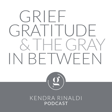
Complicated Grief and Trauma with Jeanette Koncikowski
Jeanette Koncikowski has dedicated her career to helping survivors of trauma heal and thrive while teaching others how to support them best. With a background in psychology, education, and community development, and working now as a consultant and grief coach, Koncikowski has empowered countless people to tell their stories. She is the founder of Widowed Parent Project, an online resource for widowed parents. She has written and spoken extensively on parenting, complicated grief, family bereavement, and recovery from trauma.
Website: widowedparentproject.com
Instagram: @widowedparentproject
https://store.bookbaby.com/book/shipwrecked2
Show Highlights:
- From Harvard to Home: Jeanette reflects on her journey as a mom, therapist, and Harvard graduate balancing career ambitions and family life.
- A Love and Loss: Her 21-year relationship with her high school sweetheart, Mark, and the mental health struggles they shared.
- The Shipwreck Metaphor: Jeanette describes grief as a shipwreck—navigating drowning emotions, dragging herself and her kids to shore, and rebuilding life from the wreckage.
- Prioritizing Mental Health: The critical decision to focus on counseling for her children and herself early on, and her advocacy for therapy as a universal tool.
- Evolving Grief: How her children’s grief transformed over time, and the role of therapy and support networks in their healing.
- Writing Through Grief: Inspired by her own experiences and the absence of resources for young widowed parents, Jeanette created the Widow Parent Project and wrote Shipwrecked, with a second book, Stronger Than the Storm, on the way.
- Lessons and Legacy: Jeanette’s journey to recognize the value of her story and how it offers hope, guidance, and resilience to others facing profound loss.
Contact Kendra Rinaldi to be a guest on the podcast https://www.griefgratitudeandthegrayinbetween.com/


